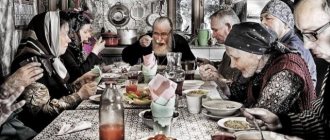Orthodox people never forget about their deceased relatives. On certain days, it is customary to go to the cemetery and pray in church for the soul of the deceased. During the first year after death, relatives make memorial dinners - for 9 and 40 days. Six months after death, people are also convened. Let's talk about how to remember six months from the date of death in more detail.
Is it possible to have a funeral service before the date of death?
In Orthodoxy, it is customary to remember the deceased for 9 and 40 days, and then six months and a year after death. Most often, a memorial dinner is organized, to which everyone who knew the deceased person well is invited (in the past, everyone took part in it, including strangers from the street).
At the same time, if it is not difficult to understand when to set the table immediately after a death, then not everyone can decide whether or not to hold a wake for six months. Thus, many believers are interested in whether it is possible to hold a funeral service before the date of death, whether this will become an insult or a sin. It really doesn't matter when to commemorate. The Church recommends doing this daily through prayer. If it doesn’t work out to invite you to lunch on a weekday, on which the wake falls, then it is done on the Sunday preceding this date.
It is also possible to commemorate it later, but it is better earlier, so that the soul of the deceased knows that they remember and care about it.
Meal for six months after death
If six months have passed since the date of death, then the person needs to be remembered. Many people choose not to host funeral dinners, but it is better to set the table and invite relatives and friends to remember the deceased with kind words. There are no special requirements for what will be used to commemorate the deceased, but kutia should be included in the menu. She prepares at home. There are many recipes for this dish. Usually the following ingredients are taken to prepare it:
How to correctly calculate six months from the date of death
The funeral must take place exactly 6 months (marked according to the calendar) from the date on which the person died. This means that they look not at the day of the week, for example, Saturday, but at the date. So, if a relative died on August 12, 2022, then he will be commemorated on February 12, 2022, or a little earlier if this date falls on an unsuitable day that is not convenient for the person organizing the memorial dinner.
It doesn’t matter whether there will be a commemoration on this day or not, the relatives of the deceased are obliged to perform all the required rituals.
On what dates after death is it customary to remember the dead? Memorial days according to the Orthodox calendar
Commemoration is an obligatory part of the rite of farewell to the deceased on the day of the funeral. In addition, other dates that are important to the soul are also marked on the calendar. At this time, the imperishable shell makes several transitions, at each stage it needs the support of loved ones. Days when it is important to remember the deceased:
- Day 3: separation from the body occurs, distance from earthly life, the soul goes to heaven as an observer;
- Day 9: the soul appears before the Lord, after which it falls into the underworld, where it needs to see the suffering experienced by those who during their lifetime violated the laws of God;
- Day 40: the incorruptible shell appears before the Almighty to accept the choice that the Lord makes regarding a person’s affairs, the power of the prayers of loved ones for him;
- 1 year from the date of death: the wake is designed to alleviate the suffering of the deceased, if the prayer is said without ceasing, this helps the disembodied shell to overcome the ordeal, a year after death it comes to loved ones to say goodbye, thereby completing the transition, which means overcoming trials in the form of temptations;
- Meat Saturday;
- Parents' Saturdays 2, 3, 4 weeks of Great Lent;
- Radonitsa - the next Saturday after Easter;
- May 9 is the day of remembrance of deceased soldiers;
- Trinity Saturday;
- Saturday Dmitrievskaya is considered the last day when you can remember your loved ones in the outgoing year.
Commemoration in Radonitsa
Is it possible to remember before the date of death?
Priests express the opinion that at each stage the disembodied shell has a hard time: ordeals, viewing torment in hell, and, for contrast, the beautiful gardens of paradise, difficult trials, numerous temptations from the devil. All these ups and downs can become a serious obstacle to the transition to purification and enlightenment. Accordingly, it is important to perform the rite of remembrance on the days established by the church. It is then that turning points for the soul occur.
In addition, if a funeral service is held earlier on the anniversary of death, this will mean that the deceased is not being commemorated, since 1 year ago he was alive. This can cause various consequences: the soul of the deceased will appear in a dream, trouble will arise. The degree of importance of such a ritual is also taken into account. If it is carried out ahead of schedule, the soul will not have time to complete the transition by that time and will lose the support of loved ones. However, these are only recommendations; even priests say that it is permissible to postpone the funeral for several days.
Just do not postpone the ceremony for a long time - you should focus on a week, no more.
Rules of remembrance in church
In the morning, before the service begins, they come to church. There:
- they buy a candle and light it for the repose of the soul (in the temple there is a special place for this near the crucifix, in a flat candlestick with a large number of cells);
- funeral food is placed on a special table for the poor, parishioners or pilgrims if the service is held in a monastery;
- they defend the liturgy from beginning to end (you will have to arrive very early);
- submit a note with the name of the deceased for commemoration (the name is written in the genitive case, not just one, but several).
It is customary to pray during the liturgy and before the funeral candle. They do this to themselves. It is not necessary to know any specific prayer; it is allowed to address God and the soul of the deceased in your own words, as the person feels what he wants to say. If funds allow, they order a magpie and a prayer service (requiem service). They will be read in church for a certain time (40 days).
You need to pray only after clearing your thoughts of bad thoughts and strong sadness for the deceased. This can be done during confession and communion. They prepare to receive the sacrament by observing a three-day fast, following the prayer rules in the morning and evening, and reading the words appropriate for the occasion from the canon.
If you cannot go to church every day or during the allotted time while the magpie is being read, you need to go to the priest and ask for a blessing to read prayers at home.
After visiting the temple:
- buy a lamp;
- they take it to the cemetery to light it there;
- along the way, alms are given to all the beggars they meet (it doesn’t have to be money, you can give cookies and sweets, not forgetting to ask to remember the name of the deceased in prayer).
The church accepts notes only for an Orthodox person who has been baptized. If a relative was not baptized, belonged to another confession, or his religion is unknown, it is better to pray silently without ordering magpie.
How to properly remember the deceased in the Orthodox Church in six months
A Christian who dies during the first year in Orthodoxy is called newly deceased. Those. when submitting notes in the church, the deceased must be designated exactly this way: newly deceased Tamara, newly deceased Vasily, etc. But the church charter does not provide for any special commemorations for the first six months after death. There are no special prayers (rites of remembrance) for this date either. A person decides independently the nature and texts of prayers.
On the day of remembrance, it is worth going to the temple, submitting notes for the repose of the newly deceased (ordering a magpie) and praying during the memorial service and at the Liturgy. It is also worth giving alms after the service. If you don’t want to give money to those sitting at the church gates, you should leave it in the church in a special box for donations. Some people save money for a funeral for six months and then distribute it to the poor. But this does not apply to mandatory requirements or traditions. Funerals are celebrated in different ways. You can simply buy food for an elderly neighbor with your own money, and this will already be help and alms.
You can pray for the soul of the deceased (mother, grandfather, brother) at home. Before prayer, you should light a lamp near a photograph of the deceased, but you can do without a lamp. Orthodox prayer can be anything. Each Christian can independently compose a prayer to any saint or use existing prayer rules.
If the deceased was not baptized or committed suicide, he cannot be commemorated in church according to the customs of Orthodoxy. In this case, it is necessary to pray to Saint Uar. But there are no special prayers or rituals for the unbaptized and suicides. Everything depends on the will of their living relatives.
How to remember the dead at home
You need to constantly remember the deceased person. In the morning, on the day of the next funeral, they get out of bed, make the sign of the cross, go up to the icon and light a lamp from it (if there is no icon, then you need to go to church and buy a suitable one).
They pray at the icon for the repose of a person’s soul; you can tell him about how things are going with the people whom he loved during his lifetime. After a light breakfast they go to church. Not all relatives can go to the temple, but only the closest ones. Those who are relieved of the duties of preparing a funeral dinner (if it is done at home). A person can die alone, but his relatives are obliged to make sure that he is not alone in the Kingdom of God. To do this, they pray, observing the church charter.
The meaning of the funeral after six months: what happens to the soul of Christians
The first six months after the death of a loved one are of greatest importance for relatives. Not everyone can calmly cope with a loss: the grief does not let go, the pain does not go away. Even knowing that this torment causes discomfort to the soul of the deceased, it is often impossible to pull yourself together. Only gradually becoming familiar with the tradition of remembrance can help you let go of attachment step by step. This is exactly the problem that is solved by adding one more day when a wake is held. This is a semi-official date - it is not celebrated in the Orthodox calendar, because it is not determined by the church. However, if it is planned to hold a funeral for six months, it is also considered.
On the day when exactly 6 months have passed since death, you can set the table and gather close friends and family. But a Christian should know that this date is celebrated in this way only nominally, since no serious changes occur to the soul. It would be right to visit the temple, light a candle for the repose, you can also order a service - a memorial service. In addition, they read a prayer, its home version - litiya. This need is due to the need to help the soul (it always needs a kind word, sacred words), as well as loved ones - they feel better when they help ease the stay of the ethereal shell of the deceased in the afterlife.
In addition, a commemoration for six months is a way to beg forgiveness for the sins of the deceased. For the Lord there is no time, restrictions and dates - this is the lot of the Church, the basis of its charter. Archpriest Igor Fomin believes:
“The time of day when it is permissible to commemorate the deceased is not regulated by religion. But there are folk traditions, most of which go back to paganism. They prescribe when memorial ceremonies can and cannot be performed, prayers can be read, and memories of the dead can be remembered. But this is not part of Christian traditions. Our Lord Almighty is in space where there is no time. People can access it at any time, be it day or night.”
Candles for the repose
Procedure for visiting the cemetery for six months
They take food with them to the cemetery (pies, candies, cookies, bread) to leave at the grave or treat people passing by. According to tradition, a meal is held in the cemetery, but now this custom is considered rather pagan and is not approved of. The clergy believe that it is wrong to eat food at a grave on the day of the funeral.
The church advises that food be packaged in neat bags and left at the funeral. Anyone who needs it can take it there. You can leave a small towel, a candle and a cup with your food. There is no need to leave alcoholic drinks at the grave; Orthodox Christians should not resort to remembering the deceased with alcohol. The cemetery is considered a place of peace and quiet; here it is customary to grieve or pray, and not to satisfy one’s hunger by indulging in the sin of gluttony. On the day of remembrance, the soul can visit the burial place of the body, you need to pray about it.
Summoning the spirit of the deceased
If 6 months have passed since the death of a person, his soul has already received a certain place in Heaven or Hell. Those. according to many sorcerers, she has become a full-fledged spirit with whom you can come into contact as part of spiritualistic sessions or other procedures. And some people (especially a mother who has lost a child, or a wife whose beloved husband has died) believe in this and try to communicate in some way with the deceased. But such magical rituals should be treated very carefully.
In the best case, the relatives of the deceased will become victims of scammers and communicate with a ventriloquist. In the worst case, they will indeed call someone, but it will not be the soul of the deceased. The consequences of magical rituals are interestingly described in the book “Unholy Saints.” In it, the author (now a priest) talks in the first person about his experience of participating in spiritualistic seances. If six months have passed, you need to arrange a wake in the church, and not look for sorcerers. The one who died cannot be returned, and one can only hope to meet him in the future, if God and Paradise really exist.
The deceased should not be forgotten either on ordinary or holidays. A wake should be held for six months from the date of the person’s death. If it is not possible to set the table and come to the grave, you should just go to church, light a candle for the repose of your loved one and celebrate this date with sweet kutya.
Giving alms and helping people in need
Almsgiving is one of the ways to tell strangers about a deceased relative. With its help they are reminded that he existed, lived, loved. They give food and small money, clothes. If there are things of the deceased left in the house that are no longer needed by anyone else in the household, but are clean and wearable, they are brought to the temple. There, clothes are distributed among people in need. This can be done immediately after the funeral or at any convenient time. There is no need to be embarrassed that the clothes are not new.
When giving out alms, they must say for whose soul the recipient should pray. Usually it's just a name, age, perhaps profession. For example: “For my grandfather Ivan, a military pilot, he lived to a ripe old age; this year he would have turned 90,” “For my mother Nina,” “For my husband Peter,” “For my father Nikolai.”
Prayer text
How to properly conduct a wake for six months
The funeral meal can be prepared at home or ordered at a restaurant. When choosing a menu or a day, consider the following:
- During Lent, all dishes should be lean. No meat, it is replaced with fish. Experienced restaurant and canteen workers do not recommend getting upset about this. There are many ways to prepare a delicious dinner for a funeral in accordance with Orthodox canons.
- Wednesday and Friday are also fast days. If relatives cannot imagine dinner without meat, it is better to postpone this event to Saturday or Sunday.
On weekdays during Lent they do not commemorate it, moving lunch to Saturday or Sunday, with the exception of Holy Saturday, on which believers do not eat food at all all day. It is allowed to eat mainly in the evening, while lunch is served in the first half of the day. Not understanding how best to proceed, they turn to the clergy for clarification.
Who to invite
Even 40-50 years ago, everyone who lived nearby - in the same house, village, who worked or studied with the deceased and his relatives - was invited to a memorial service. Uninvited guests could also come to dinner, no one prevented this; on the contrary, such a person was received very well. Now the situation has changed somewhat. Funerals are no longer held at home and strangers are not invited to them. Usually, those who come include only relatives and friends, sometimes colleagues who have known the deceased all his life.
Lunch is no longer prepared at home; most often, a table is ordered in a restaurant, because the number of people is strictly defined, and everyone has already been paid for. There are no restrictions on who to invite. If possible, you can call the whole district or the whole village. The degree of acquaintance with the deceased is also not important; it is even good that when the person is unfamiliar, relatives have a chance to tell him about all the good qualities of the deceased. The dead are always spoken about by focusing on positive character traits and actions, especially at the funeral dinner.
Dishes on the funeral table
Prepare for the funeral table:
- pancakes;
- borscht or mushroom soup;
- buckwheat porridge, if fasting, then without butter;
- pies (filling – fish, pumpkin, mushrooms, potatoes, sauerkraut);
- jelly or dried fruit compote.
There should be no alcoholic drinks on the table.
The main dish is kutia. The porridge is made from white rice, seasoned with honey, raisins, and nuts. Refined wheat grains can be used instead of rice. They carry the kutya to the church and ask the clergyman to bless it.
The meal begins with the reading of a prayer. It’s better if the priest does it, but it’s not necessary. Lunch begins by eating 3 tablespoons of kutia. It is placed in beautiful bowls and served first, even ahead of the hot dish.
Funeral table
Funerals at the table are a tradition dating back to pre-Christian pagan times. Today it has undergone certain changes, and it must be followed in accordance with Orthodox canons.
Funeral table dishes
The dishes on the funeral table are modest and unpretentious. This rule is especially strictly observed during church holidays, and Wednesday and Friday of each week are fast days.
Important. An Orthodox funeral is not a reason to gather, eat and talk noisily. This is a time for warm words of support and memories. Lunch is part of a common ritual, and not an ordinary feast.
Traditional food - pancakes, kutia, jelly. The dishes are prepared at home, or the funeral service is ordered in a restaurant or cafe.
It is not necessary to hold a memorial dinner in the apartment where the deceased lived. It is allowed to use catering services for a mournful meal.
Only the closest circle of the deceased is invited for half a year. First, people gather at the cemetery, then go to the funeral.
If six months from the date of death fell during Lent, then commemoration should be held only on Saturday or Sunday.
This fact must be taken into account and not worry if you have to reschedule the ritual.
At the table, it is appropriate to remember the deceased, talk about what kind of person he was, and list the good deeds accomplished during his lifetime. It is allowed to pronounce toasts and special poems.
According to Orthodox tradition, the funeral table is done without alcohol. Unfortunately, the laity miss this important moment of the ritual feast. This is especially true in cases where the deceased liked to drink a glass, then people mistakenly believe that they should see him off in a stormy and noisy manner.
Do not make such mistakes; such behavior primarily harms the soul of the deceased. We are obliged to pray for the departed in order to provide them with a worthy transition to the best of worlds.
How to remember an unbaptized person
If a person has not been baptized, he is also remembered. This can be a regular meal without reading prayers in church. No one forbids honoring his memory at home, in a narrow circle. Funerals as a way to get everyone together and honor the memory of the deceased are also not abandoned.
By praying, those who believe that God exists and that the soul, having disappeared from this world, has merely passed on to a better world, pave the way for it to salvation. The unbaptized, Muslims, and Jews are not buried and the usual rituals are not performed on them, but there is no prohibition on praying and remembering them.
Basic mistakes and rules
Often people do not know how to remember for six months after death, what traditions can be observed and which ones are better to abandon. So, at lunch:
- they do not sing, do not laugh or speak badly about the deceased;
- conduct quiet conversations, talking about the good deeds of the deceased.
After lunch or before it starts, bags of sweets and gingerbread are distributed to everyone present. There should be few sweets. They are supposed to be brought home or eaten directly at the wake, after reading a prayer for the deceased. It is not necessary for children to read prayers. Sometimes along with sweets they give a plate, cup, candle or small towels. Dishes and food brought from lunch must be used for their intended purpose, put in a far corner, the dishes cannot be hidden, they must be used.
What not to do
A funeral service is a special day on which you can and should go to the cemetery, to church, to pray for the deceased, to light a candle for his soul. Six months after the death of a person, relatives hold a memorial dinner, inviting those who knew the person during life to share with him. Make it at home or in a cafe. At the same time, they take into account that the meal is not a holiday; it may be meager or not sufficiently satisfying, for example, during Lent. The main thing is to remember the person, to show his soul that his loved ones do not forget about him.
Question-answer section
When do relatives inherit?
Expert opinion
Yesentsev Vladimir Nikolaevich
Lawyer, specialization “Inheritance Law”
Funerals six months after the death of a loved one are associated with the date when all deadlines for confirming the right of inheritance expire. This can be done within the first 6 months. To enter into an inheritance, you must contact a notary in time and sign the relevant documents. The procedure for transferring property can be violated in several cases:
- the testator has prepared a will;
- relatives are legally illiterate - they do not know about the restrictions that determine the possibility of receiving an inheritance (up to 6 months);
- there was a fact of concealment of the date of death of the testator.
Is it possible to remember a suicide in church?
Expert opinion
Father Pavel
Clergyman
It is prohibited to hold a funeral service or commemorate a person who has killed himself. His name is not spoken in a holy place. However, relatives are allowed to help the lost soul - they can pray asking for forgiveness of the sins of the deceased.
If a person was an unbeliever, is it necessary to order a memorial service?
Expert opinion
Father Pavel
Clergyman
It is prohibited to hold services and commemorate people who never came to God during their lifetime. Suicides and non-believers, as well as the unbaptized, cannot be buried; during funeral services they are not remembered in the church.
Funeral service for six months after death, what should relatives do?
Expert opinion
Father Pavel
Clergyman
You can say prayer words at home, light a candle. There is an alternative option - going to church and being present during the service. Then they go to the cemetery, and then distribute funeral food to the poor.
Visit to the temple
Is it necessary to remember for six months?
Expert opinion
Father Pavel
Clergyman
It is not necessary to say goodbye to the deceased on days that were not designated by the church for commemoration. The date six months after death is one of them. You can skip it, the soul does not undergo tests at this time, and therefore remains indifferent, does not suffer much if relatives do not come.
What do they give out at funerals for six months after death?
Expert opinion
Father Pavel
Clergyman
It is customary to give sweets (sweets, cookies), but few people realize that this does not help, but harms the soul. It is best to cook pies or other savory foods. Candy is appropriate as a treat for children. They are sinless and will help the soul if they remember the deceased.
What do they order in the church for six months from the date of death?
Expert opinion
Father Pavel
Clergyman
A memorial service and liturgy are held. At the same time, a universal commemoration is carried out - for a large number of people. In order for the name of a relative to be read, a note must be submitted to the shop at the temple.











